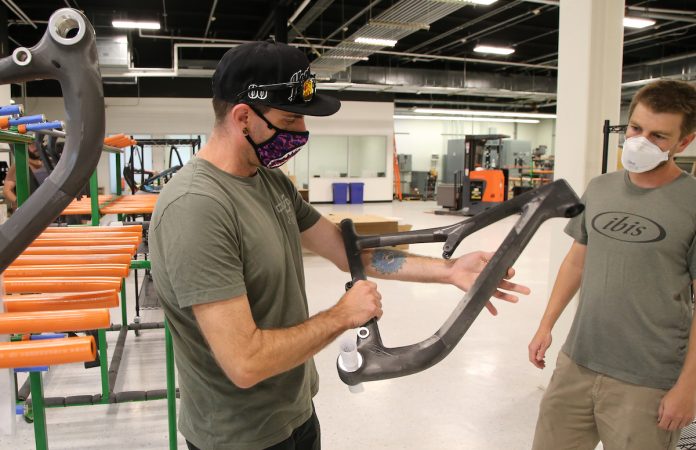PAJARO—In a factory centered in a rural stretch of Pajaro, a small team of workers and engineers was busy one Tuesday afternoon hand-building a new line of cross-country racing bicycles they hope one day will be used by Olympic athletes.
The work was happening in Ibis Cycles production facility, where they produce the Exie, a top-of-the-line model made by a company that is considered to be one of the world’s best bike makers.
Weighing in at roughly 22 pounds with all the components, the dual-suspension Exie—and the company’s other models—are best known for one-piece frames fashioned from carbon fiber. This ultra-lightweight and super-strong material has become the standard for mountain bikes since Ibis started the trend. It is believed to have the best strength-to-weight ratio of any material on earth.
The Exie is not the first of its kind on the market; Santa Cruz, Specialized and Cannondale bike companies all make their own version of carbon fiber cross-country bikes.
But Sales Manager Josh Tonnissen says it is the best among a field of worthy contenders.
“If Specialized is Toyota, and Santa Cruz is Ferrari, we are a McLaren,” said Sales Manager Josh Tonnissen, referring to the British automaker whose luxury cars go for up to $2.2 million. “We’re the top echelon of high-end, carbon fiber mountain bikes on the market.”
The process of creating the frames is extensive, with workers layering by hand multiple pieces of thin, custom-cut carbon fiber material over a center foam core, and then baking the frame at high temperature.
This process is radically different from most other bicycle manufacturing, where several pieces are welded together.
Ibis’ process assures that their bikes can better withstand the punishing trials and tribulations to which cross-country riders subject them.
Most of the company’s carbon-fiber bicycles are made at factories in Asia, because of the enormous labor involved.
But the company decided to make the Exie here in their Pajaro factory, where 50 employees turn out around 40 frames per month, a number they hope to more than double.
Making them here also allows the company to perform in-house strength testing and other quality control, says Manufacturing Engineer Travis McCart.
The Exie, which is sold around the world, is not for the uninitiated. A base model goes for about $8,000.
The Ibis brand, known globally and headquartered in Santa Cruz, was launched in 1981 by Scott Nichol, who began making hand-welded mountain bikes in a small shop in Mendocino at the time when mountain biking was virtually unheard of.
“Before that, people were taking beach cruisers, putting on knobby tires and riding them off-road,” Tonnissen said. “We are a small bike company, and basically were one of the pioneering bicycle brands making mountain bikes.”
The company was one of the first to use carbon fiber for mountain bikes, and in 2005 was the first to use it for full suspension bikes, which have shocks front and back.
Before that, most bikes were aluminum, which is much heavier and not as strong. At the time, most other companies believed that carbon fiber was only appropriate for road bikes.
“We kind of proved them wrong, and now that is the standard,” Tonnissen said.
For information on Ibis Cycles, visit ibiscycles.com.









